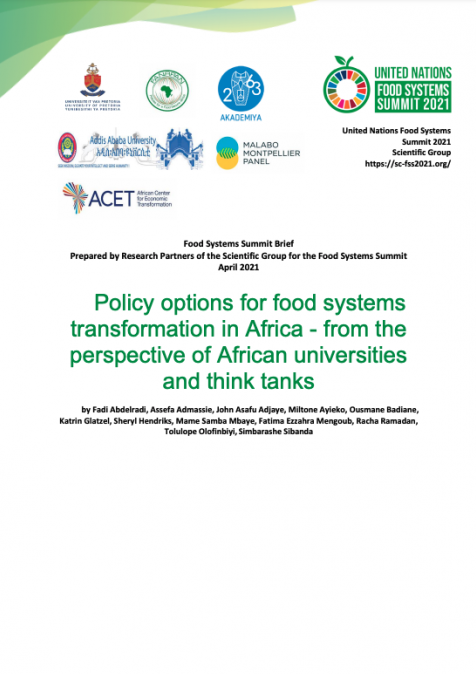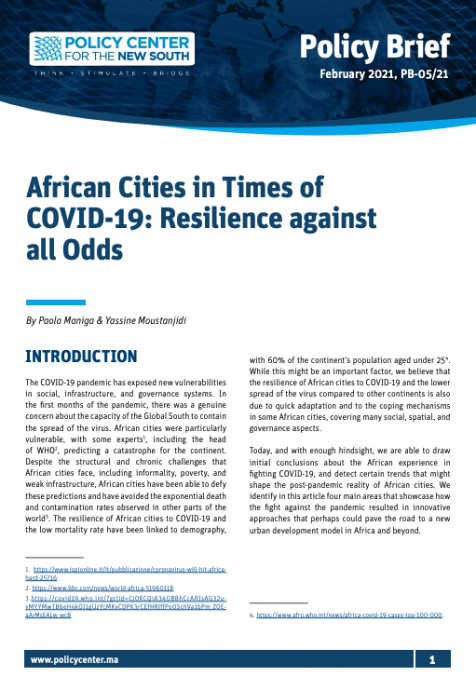RELATED CONTENT
-
Nihal El Mquirmi, Isabelle Tsakok, & Rabi MohtarMay 20, 2022Traders have worried that the war involving Russia and Ukraine could stoke inflation, further disrupt supply chains and derail the global economic recovery. Scarcity of food has led ...
-
-
April 29, 2022Following on the heels of the COVID-19 pandemic and severe drought in North Africa, the Russian invasion of Ukraine – large exporters of food and, in the case of Russia, energy— may inflict increased hunger on the food insecure in Morocco – despite mitigating measures by the government. Morocco is so far successfully shielding its large poor and vulnerable population by subsidizing essential commodities. With memories of the violent protests during the 2007/08 food and fuel crisis ...
-
AuthorsApril 21, 2022For the second time, Côte d'Ivoire is known for being a "miracle economy" –high aggregate GDP growth of 8% per year since 2012. Despite this achievement, its food systems are unable to deliver food security to most Ivoirians. These systems are being undermined by several structural factors, which include broad-based low productivity and limited diversification of its agri-food sector; the high numbers of extremely poor, some 30% of the population; and the vulnerable who are millions ...
-
Ahmed Ouhnini et Henri Louis VédieApril 08, 2022L’Ukraine et la Russie comptent parmi les plus grands exportateurs de blé au monde et jouent un rôle capital dans la sécurité alimentaire dans le globe. Or, plusieurs pays d'Afrique se re ...
-
 AuthorsMarch 1, 2022Known for being a climate change hotspot, Morocco is at the forefront of a climate disaster. Consequences are already being felt, whether in the form of increasing temperature or a downward trend in precipitations, which directly threaten the water security and, by extension, the social-ecological systems of the country. The systems by which food, energy, and water are produced, distributed, and consumed heavily depend on one another. Their implicit feedbacks and links are not linea ...
AuthorsMarch 1, 2022Known for being a climate change hotspot, Morocco is at the forefront of a climate disaster. Consequences are already being felt, whether in the form of increasing temperature or a downward trend in precipitations, which directly threaten the water security and, by extension, the social-ecological systems of the country. The systems by which food, energy, and water are produced, distributed, and consumed heavily depend on one another. Their implicit feedbacks and links are not linea ... -
AuthorsDecember 10, 2021Addressing the increasing demands for water, energy, and food requires a coherent methodology to ensure that societies have access to them and that conflict over them is avoided. For example, agriculture and food production require water and energy; energy production also requires water and, in some instances, agricultural products. Water distribution and treatment can be very energy intensive. Therefore, the benefits of approaching the Water- Energy-Food (WEF) nex ...
-
AuthorsFadi AbdelradiAssefa AdmassieJohn Asafu AdjayeMiltone AyiekoOusmane BadianeKatrin GlatzelSheryl HendriksMame Samba MbayeRacha RamadanTol Fadi AbdelradiAssefa AdmassieJohn Asafu AdjayeMiltone AyiMay 25, 2021Within the context of the United Nations Food Systems Summit taking place in September 2021, this brief discusses key drivers of food systems in Africa, as well as the challenges and opportunities for transformation. It concludes with specific policy options that could considerably accelerate progress towards the transformation of food systems across the continent. Specifically, this policy brief makes five recommendations: it recommends that investment in research and development f ...
-
AuthorsPaola ManigaYassine MoustanjidiFebruary 15, 2021The COVID-19 pandemic has exposed new vulnerabilities in social, infrastructure, and governance systems. In the first months of the pandemic, there was a genuine concern about the capacity of the Global South to contain the spread of the virus. African cities were particularly vulnerable, with some experts1, including the head of WHO2, predicting a catastrophe for the continent. Despite the structural and chronic challenges that African cities face, including informality, poverty, a ...
-
Fatima Ezzahra Mengoub, Isabelle TsakokFebruary 04, 2021Ensuring food security for a growing population is one of the major challenges of the coming decades. The scarcity of natural resources, the negative impact of climate change on agricultu ...








